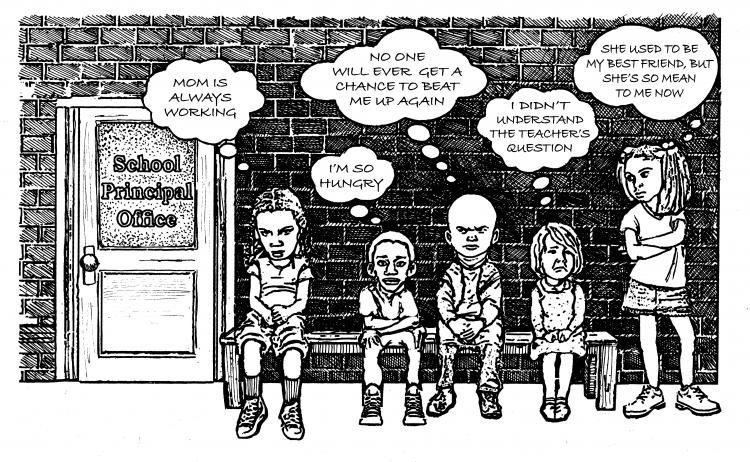The need for trauma-informed discipline in educational settings is clear in the findings of two different research teams: Vinetra L. King and Sylvie Mrug of the University of Alabama at Brimingham, and Brea L. Perry of the Univeristy of Indiana and Edward W. Morris of the University of Kentucky. Mrug and King are a faculty-Doctoral candidate team working in the Psychology department, focusing their work specifically on exposure to violence and behavioral issues in adolescents. Perry and Morris are professors of Sociology at their respective institutions, both with research experience in the sociology of education.
Emotional Coping Skills
Witnessing domestic and community violence was shown to have adverse effects on academic achievement both close to the time of traumatic event and two years later, especially in students who have been identified as having poor emotional regulation skills (Mrug and King, 2018, p. 505). From this study, it is clear that high levels of experienced trauma coupled with poor emotional coping skills lead to declining academic achievement.
Witnessing traumatic events has been directly linked to problems internalizing and externalizing problems (Mrug and King, 2018, p. 507), which lead to difficulties interpersonal relationships and discipline. Thus, increasing time and resources dedicated to students’ social and emotional coping skills can be instrumental in combatting this observed academic decline in students who have experienced trauma.
Exclusionary Discipline
In-school and out-of-school suspensions are common elements of no-excuses discipline policies. However, according to Perry and Morris, exclusionary discipline has negative effects on student performance and school climate. Exclusionary punishment, when used as the primary form of discipline, can create a “volatile and socially disorganized environment” as a result of the social instability suspension causes (Perry and Morris, 2014, p. 1071).
Students act out in school for a host of reasons, including experienced trauma. Internalization of experienced violence has been connected to depression and anxiety, as well as school refusal and behavioral issues (Mrug and King, 2018, p.498). Thus, students who have experienced significant trauma in their lives are more likely to exhibit behavioral problems and more likely to bear the effects of exclusionary discipline.
Shifting Discipline Practices
In order to observe the effects of experienced domestic and community violence on academic achievement, Mrug and King chose to study African American students in Birmingham, Alabama, as this is a population shown to be over-exposed to trauma (Mrug and King, 2018, p. 497). Low socioeconomic status has also been connected to high exposure to domestic and community violence, indicating that the African American community in Birmingham has high rates of experienced trauma based on its low median family income (Mrug and King, 2018, p. 499, 502).
Based on the predisposition of low-income communities to be exposed to community and domestic violence, schools in these areas could shift their discipline policies to be more responsive to trauma. Decreasing exclusionary punishments and increasing emotional support for students has the potential to improve school environment and provide students with the greatest chances for social and academic success.
